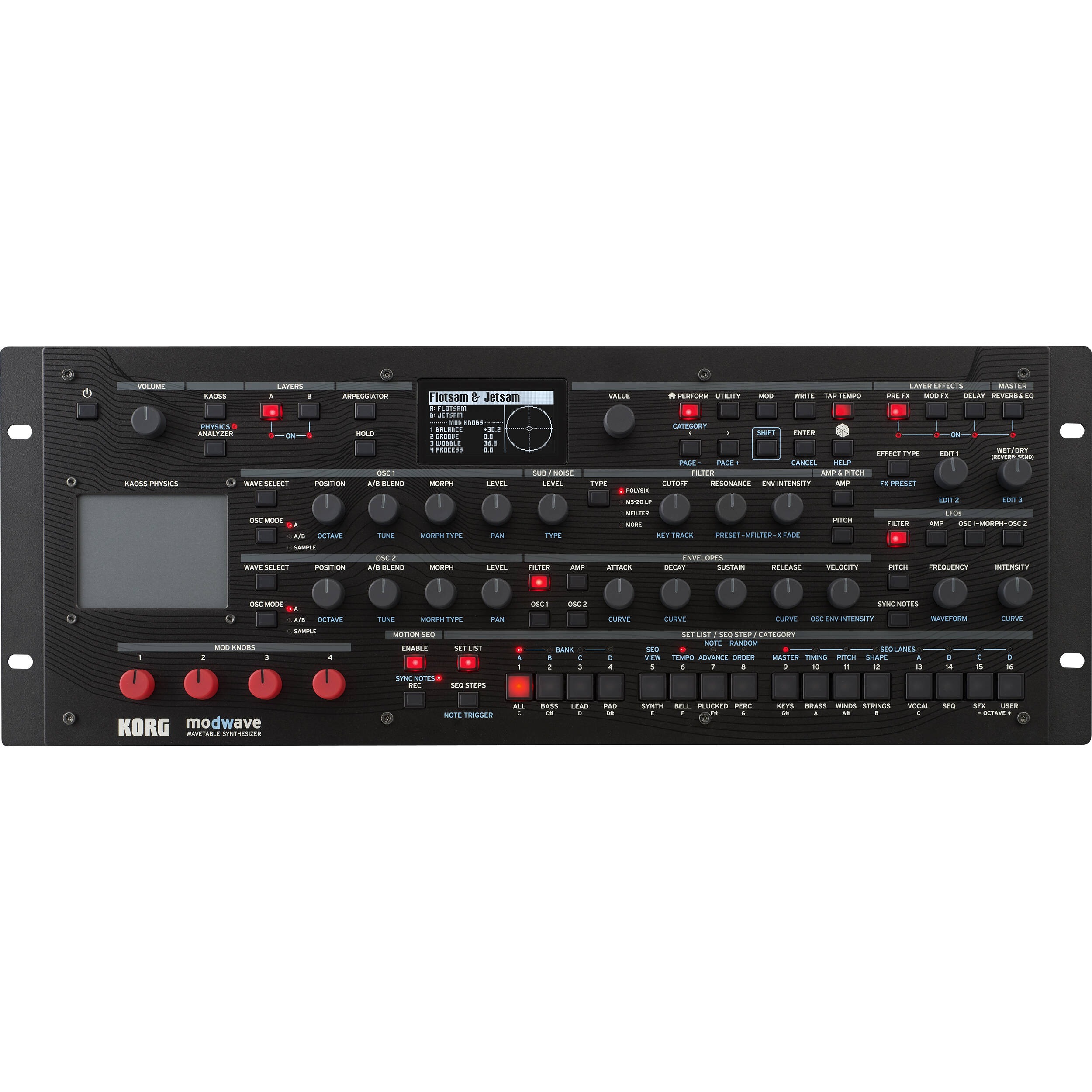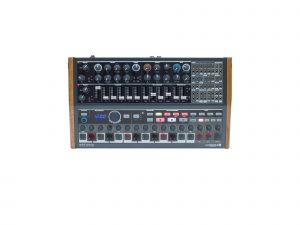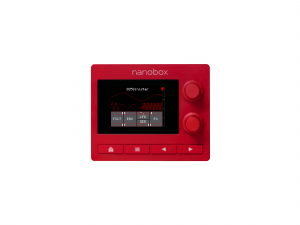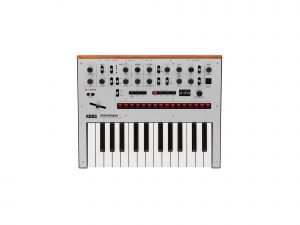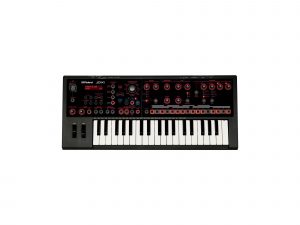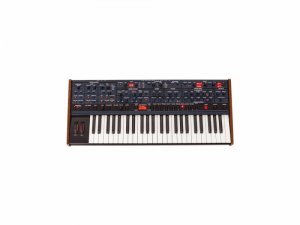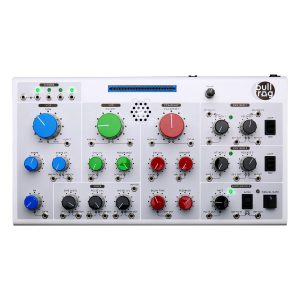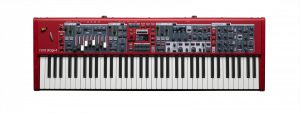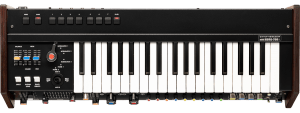The modwave module features Motion Sequencing 2.0 and Kaoss Physics. Motion Sequencing 2.0 brings the organic, continuously evolving patterns of the wavestate’s Wave Sequencing 2.0 into the world of motion sequencing, including multiple lanes and real-time recording to help you create complex and evolving phrases. Kaoss Physics combines an X/Y Kaoss pad with modulatable game physics to create responsive, interactive control that is not only powerful, but heaps of fun to explore. For even more power, layer two programs to play up to four simultaneous wavetables per voice in a single Program. The 5-pin DIN MIDI I/O jacks allow for the connection to external equipment and sequencers, while the class-compliant USB MIDI (USB-B) port can connect to Windows and Mac computers. A dedicated modwave editor/librarian is available for free at the Korg website. The Korg modwave module ships with a power adapter.
New Updates
- Like modwave mkII, the modwave module provides an astonishing 60 stereo voices of polyphony—almost double the original modwave’s 32, and an unprecedented number for a wavetable synth at any price. The new 4 RU rackmount enclosure has the same controls as the keyboard models, yet is easily transportable and fits neatly into any studio or desktop production system.
- Responding to user requests, Korg has updated all LFOs with options for free running, delayed start, and retriggering. Korg added a pre/post switch for reverb sends, new modulation sources, and more. A software update will be available for the original modwave.
- The modwave module is fully compatible with the sounds and samples of the original modwave, modwave mkII, and modwave native software, as well as many excellent third-party libraries.
MIDI 2.0 and Polyphonic Aftertouch
- The modwave module is cleverly designed for both desktop and rackmount use. The panel is redesigned to fit into a standard 19″ width, and the rear jack panel is recessed to allow easy access to cables even with gear mounted directly above. With desktop setups, brackets offer a choice of panel angles: flatter for performing standing up, or more upright for working while seated in your studio.
- Many musicians have requested a module version of the modwave. Now that components are once again available after a long period of supply-chain disruption, Korg is pleased to make that request a reality.
Overview
- Massive wavetable library and shaping features for completely unique sounds
- Physics-based KAOSS modulation delivers nonstatic, evolving modulations
- Motion Sequencing 2.0 provides new levels of control over recording and editing phrases, along with fantastic randomization to spur more ideas
- Over 200 wavetables to explore with up to 64 waveforms each—more than any wavetable synth—and over 230 million wavetable variations via modwave’s modifier and morph features
- Gigabytes of samples onboard blend with wavetables for even more possibilities
- Two-oscillator structure
- Two-part multitimbral with key zoning for splitting/layering
- 60-note polyphony
- Sequencing with timing, pitch, shape, variable loop points, randomization, and more
- Dual arpeggiators
- Three effects per layer, master EQ, and reverb
- Free software bundle, downloadable free editor
modwave Synthesis Engine
- With over 200 wavetables, each containing up to 64 waveforms—from thousands of individual waves, the modwave synthesizer is deep. Use the 30+ Modifiers to change their basic character and 13 Morph Types to process them in real time. Create new hybrids from any two wavetables using the unique real-time A/B Blend—over 230 million wavetable variations out of the box, before you even add modulation.
- Expand your palette even more by importing new wavetables using the Editor/Librarian software. Try the many free and commercial wavetable libraries in the standard Serum format, or create your own using the free cross-platform WaveEdit, available in a custom version for the modwave. Layer wavetables with samples from the built-in multigigabyte PCM library, or import up to 4GB of your own samples using Korg’s Sample Builder software.
- Each Program has two full-featured wavetable oscillators, a sub oscillator/noise generator, and any of a dozen stereo filter types, including the aggressive MS-20, sweet Polysix, and the newly enhanced Multi Filter. Animate almost any parameter using the massively flexible modulation system, with four triggerable envelopes, five LFOs, dual mod processors, and two key-track generators—plus multilane Motion Sequencing and Kaoss Physics.
- Even with all that synthesis power, playing up to four simultaneous wavetables per voice in a single Program, the modwave mkII achieves 60-voice polyphony, incredible for a wavetable synth. Layer two Programs together for double the possibilities.
Kaoss Physics
- Kaoss Physics models a ball rolling on a surface and bouncing off of walls. The surface can tilt in any direction. A bump with variable height/depth and location attracts or repels the ball. Adjustable friction slows the ball’s travel, and adjustable time controls the speed of the entire model. All of these characteristics are modulatable, so you can change them in real time.
- Start the ball by flicking a finger on the x/y pad, or launch the ball automatically using another modulation source. You can also directly control the ball by holding your finger on the pad. The position of the ball produces eight modulation signals, which can be used to control any modulation destination: the X and Y locations, the distance from the center, the angle relative to the X axis, and finally separate signals for +/- X and +/- Y.
- Walls can slow down the ball, as if they were padded, or accelerate the ball, like bumpers in a pinball machine. The walls can also be removed entirely, so that the surface wraps around to the opposite edges like a vintage arcade game.
- The modeled environment can create specific modulation effects. For instance, use a centered bump with negative height, so the modulation values always eventually return to 0. Or, position a bump with positive height on a side or a corner, to push modulation values away from that zone.
- The result is an interactive controller that amplifies your physical gestures, transforming them into complex musical results.
Motion Sequencing 2.0
- Motion Sequencing 2.0 is evolved from the Wavestate’s Wave Sequencing 2.0. Timing, Pitch, Shape, and four sets of Step Sequence values are separated into Lanes, each with its own loop start and loop end, adding a deeper, more customizable level of phrase and modulation recording.
- Every time the sequence moves forward, the individual Lanes are combined to create the output. For instance, a step sequence value may be matched with a different duration, pitch, and shape every time that it plays. You can modulate each Lane’s loop points separately for every note, using velocity, LFOs, envelopes, Mod Knobs, or other controllers. Each note in a chord can be playing something different.
- Lanes can also randomize the step order every time they play. Finally, individual steps can be randomly skipped, with a modulatable probability from 0 to 100%. The results are organic ever-changing sounds that respond to your control. The dual onboard arpeggiators can interact with Motion Sequences for even more possibilities.
Deep Synthesis Engine
- Wavetables are sets of single-cycle digital waveforms arranged in a specific order. The wavetable’s Position determines which waveform is played. Moving the Position with an envelope, LFO, or other modulation source creates subtle or dramatic changes in timbre. Some wavetable systems switch abruptly from one waveform to another; others crossfade smoothly between them. The modwave can do either one.
- Modifiers: Use over 30 Modifiers to alter the character of any wavetable at load time. For instance, isolate the odd or even harmonics, add weight through anti-aliased quantization or saturation, or revisit the gritty character of old-school wavetable synths with the Vintage 8 and 12 options.
- Morph: The 13 Morph Types let you stretch, squeeze, reflect, and otherwise alter the wavetables in real time, changing their timbre and creating additional motion in the sound when modulated. Sync creates classic swept-sync timbres, using only a single oscillator. Three special Morph Types—FM, AM, and Ring Mod—modulate Osc 2 with Osc 1, and even apply to samples.
- A/B Blend: Using the unique A/B mode, oscillators can blend any two wavetables with phase-synchronous precision—different from simply layering voices—opening up a dimension of intermediate waveforms. Add body to otherwise thin waveforms for instance, or add a touch of sizzle to a mellow timbre. Even fade between two different Modifier versions of the same wavetable. A/B Blend can be modulated in real time.
Gigabytes of Samples
- Add vintage character to your sounds with the aggressive MS-20 Lowpass or Highpass filters, or the strong, sweet Polysix Lowpass—all newly enhanced with gain controls to make it easier to dial in the resonance timbre. Shape and refine with a full collection of resonant 2-pole and 4-pole low-pass, high-pass, bandpass, and band-reject filters. Or, step outside the box with Korg’s unique Multi-Filter, which creates modulatable blends of multiple modes simultaneously—now with presets on a front panel knob for easier exploration of its many possibilities.
Control and Modulation
- Bursting with knobs and controllers, the modwave invites you to explore. Oscillators, filter, envelopes, LFOs, and effects are all at your fingertips with dedicated front-panel controls. Four programmable Mod Knobs are customized to bring out the most in every sound. Use the knobs performing in real time, and save the results as new sounds. The Hold button lets you sustain notes or chords indefinitely, while you explore the front-panel controls or play other gear.
- Add KAOSS Physics and the pitch-bend and modulation wheel for multiple dimensions of real-time expression.
- Almost all front-panel knobs and most onscreen parameters can be modulated. You can even modulate settings for individual Motion Sequence steps. Mod Processors let you transform modulation signals using quantization, smoothing, curvature, and more.

